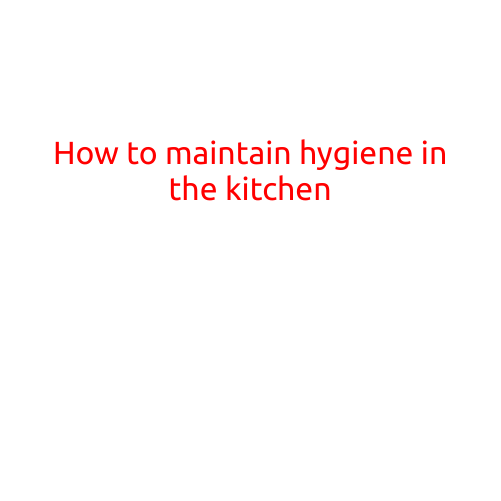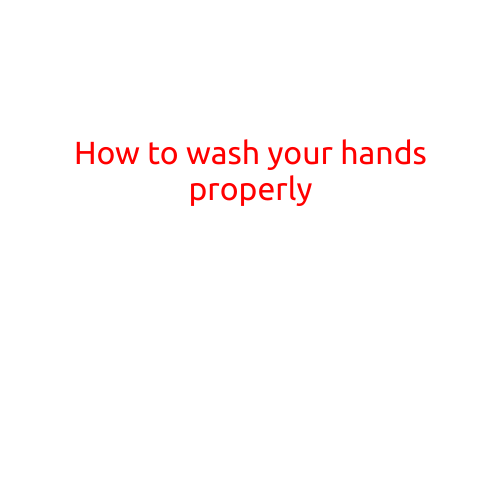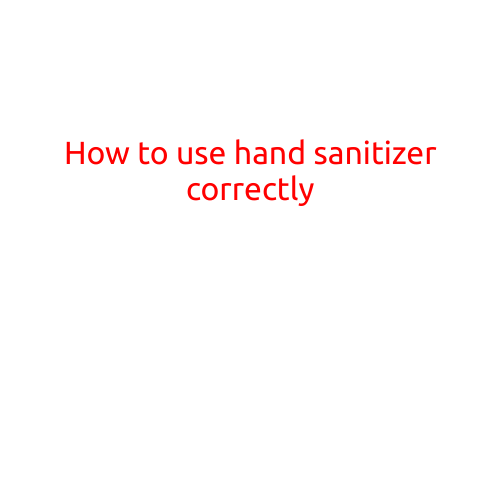
How to Maintain Hygiene in the Kitchen
When it comes to food preparation and cooking, a clean and hygienic kitchen is essential to prevent the spread of bacteria and other microorganisms that can cause foodborne illnesses. Despite the importance of kitchen hygiene, many of us often overlook the simple practices that can make a big difference in maintaining a clean and safe kitchen. In this article, we’ll provide you with some practical tips on how to maintain hygiene in the kitchen.
Wash Your Hands Frequently
One of the most critical habits to adopt in the kitchen is washing your hands frequently. Before starting to cook, wash your hands with soap and warm water for at least 20 seconds. After handling raw meat, poultry, or fish, wash your hands again. Additionally, wash your hands after blowing your nose, coughing, or sneezing to prevent the spread of germs.
Clean as You Go
Cleaning as you go is another effective way to maintain hygiene in the kitchen. This means cleaning up spills and crumbs immediately and wiping down surfaces after use. By doing so, you’ll prevent crumbs and spills from building up and attracting ants, rodents, and other pests. Assign a “cleaning station” in your kitchen with all-purpose cleaners, disinfectants, and paper towels to make cleaning up easier.
Proper Storage of Food and Utensils
Properly storing food and utensils is crucial for maintaining hygiene in the kitchen. Always store food in airtight containers or zip-top bags to prevent cross-contamination with other foods. Label all containers with the date of storage and the type of food inside to ensure you use the oldest items first.
Regularly Clean and Disinfect
Regular cleaning and disinfecting of kitchen surfaces, utensils, and equipment is vital for maintaining hygiene. Use a gentle disinfectant cleaner and a soft cloth to wipe down surfaces, including countertops, sinks, faucets, and stoves. Pay special attention to areas around sinks, where bacteria can easily accumulate. Disinfect high-touch areas, such as doorknobs, light switches, and countertops, at least once a week.
Proper Handling of Raw Meat and Poultry
Raw meat and poultry can be hazardous to food safety if not handled properly. Always wash your hands thoroughly before and after handling raw meat and poultry. Store raw meat and poultry in separate containers and keep them away from ready-to-eat foods. Use separate cutting boards, plates, and utensils for raw meat and poultry to prevent cross-contamination.
Proper Food Storage
When you’re not cooking, store leftovers in shallow containers and refrigerate them at 40°F (4°C) or below within two hours. Label leftovers with the date of storage and the type of food inside. When storing leftovers, use airtight containers and keep them out of reach of children and pets.
Tips for Maintaining a Clean Kitchen
- Keep a “clean zone”: Designate a specific area of your kitchen as a “clean zone” where you can prepare ingredients and wash dishes without compromising cleanliness.
- Use a trash can with a lid: Keep a trash can with a lid in your kitchen to prevent pests and odors from spreading.
- Maintain a clean sink: Clean your sink after each use and disinfect it at least once a week.
- Wipe down appliances: Wipe down appliances, such as the refrigerator, dishwasher, and oven, with a soft cloth and gentle cleaner to remove crumbs and spills.
- Don’t leave dirty dishes overnight: Leave dirty dishes in the sink overnight, as this can attract pests and create unpleasant odors.
By following these simple tips, you’ll be able to maintain a clean and hygienic kitchen that’s safe and enjoyable for you and your family. Remember, cleaning and maintaining your kitchen is an ongoing process that requires regular attention to ensure food safety and prevent the spread of bacteria and other microorganisms.





